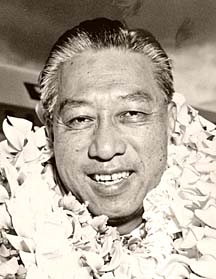
[ OUR OPINION ]
Hiram Fong carved
an abundant life
from humble origins
|
It is an old-fashioned notion often dismissed as sentimental, obscured in the present day by an expectation of privilege. Hiram Fong wasn't handed his successes; he earned them.

|
Through a long life that ended at age 97, he supported civil rights legislation, pushed hard for bills to end racial and ethnic quotas in immigration, advocated vigorously for education funding and backed organized labor to improve working conditions for ordinary people.
Through various enterprises, he made millions of dollars, building Market City, one of the first shopping centers on Oahu, and co-founding Finance Factors Ltd., a group of businesses based in real estate, investments, lending and insurance. With associates, he established a multi-ethnic law firm, Fong, Miho, Choy and Robinson, a rarity at the time.
Retiring from politics, Fong opened a botanical garden where visitors touring his Kahaluu property were frequently surprised to find him puttering around fruit trees and stands of ti leaves or greeting people heartily at the snack counters.
It was a life full of blessings, but also peppered with disappointments. A floating, harbor-side restaurant went bankrupt; plans for another shopping center fell through; and financial problems forced him to auction off the garden. In 2003, a series of painful disputes and legal conflicts among some family members and others pushed Fong and his wife, Ellyn, to file for bankruptcy.
These plaintive notes do not deafen an otherwise concordant life.
"He was a great believer in the American dream," said his son, Hiram Fong Jr., "because he was a product of it."
Ethanol can loosen
oil’s grip on islands
|
Taken as a whole, there appear to be few drawbacks in converting sugar cane into a fuel that when blended with gasoline can decrease carbon dioxide emissions and possibly spur interest and growth in renewable resources.
For 10 years, Hawaii has had a law on the books mandating that 85 percent of gasoline sold in Hawaii contain 10 percent ethanol. But because none was produced in the islands and importing was not feasible, the law sat dormant. However, now that sugar growers are seeking to develop non-food products and the state is providing tax incentives and supporting revenue bonds for plant construction, officials are working on rules to apply the law.
Drivers should not expect that filling up will be cheaper because oil companies will still control production of the high-profit base commodity in an exceptionally uncompetitive market. Indeed, it would be no surprise if the industry uses the mandate as justification for adding a few cents to the price of a gallon. Nonetheless, insertion of ethanol producers into the mix could work to loosen the oil industry's grip.
Ethanol plants are envisioned for Kauai, to tie in with cane growers Gay & Robinson, and on Maui and Oahu. Ethanol will be problematic for the Big Island since there are no plans for production there. In addition, Oahu will have to import molasses to convert into ethanol since sugar is no longer grown here.
Estimates are that current sugar crops can deliver about 75 percent of the cane needed, but research should continue to determine the best plants for conversion and to assure that fertilizer use does not increase nitrous oxide pollutants from ethanol emissions. Officials should also keep an eye on how much energy is used to make ethanol even as producers hope to run their plants using their own products. It does little good if more oil is consumed to make and distribute a renewable fuel.
